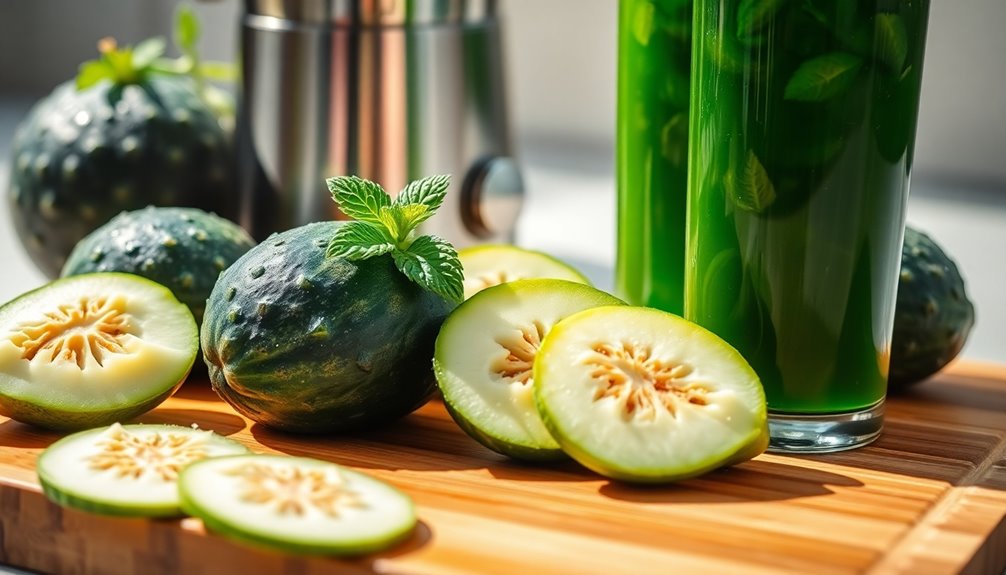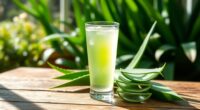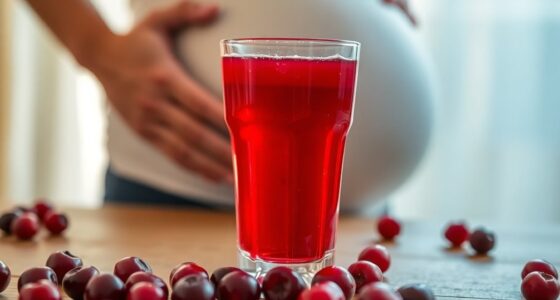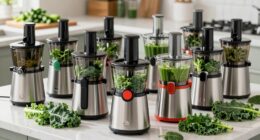To make bitter melon juice, start by washing two bitter melons and removing the ends. Halve them and scoop out the seeds, then chop the melon into smaller pieces. Blend these with ripe pineapple, a bit of ginger, juice from one lime, and two cucumbers for extra hydration. Blend until smooth, and strain if desired. Serve immediately for the freshest, nutrient-rich drink. There's so much more you can learn about its benefits and preparation.
Key Takeaways
- Wash and prepare two bitter melons by removing ends, halving them, and discarding seeds before chopping into smaller pieces.
- Combine chopped bitter melons with ripe pineapple, a piece of ginger, lime juice, and cucumbers in a juicer or blender.
- Blend or juice all ingredients until well mixed; if using a blender, strain the mixture for a smoother texture.
- Enjoy the refreshing juice immediately to maximize nutrient intake and benefit from the balance of bitterness and sweetness.
- Incorporate this nutritious beverage into your regular health regimen for its potential benefits in managing blood sugar and boosting immunity.
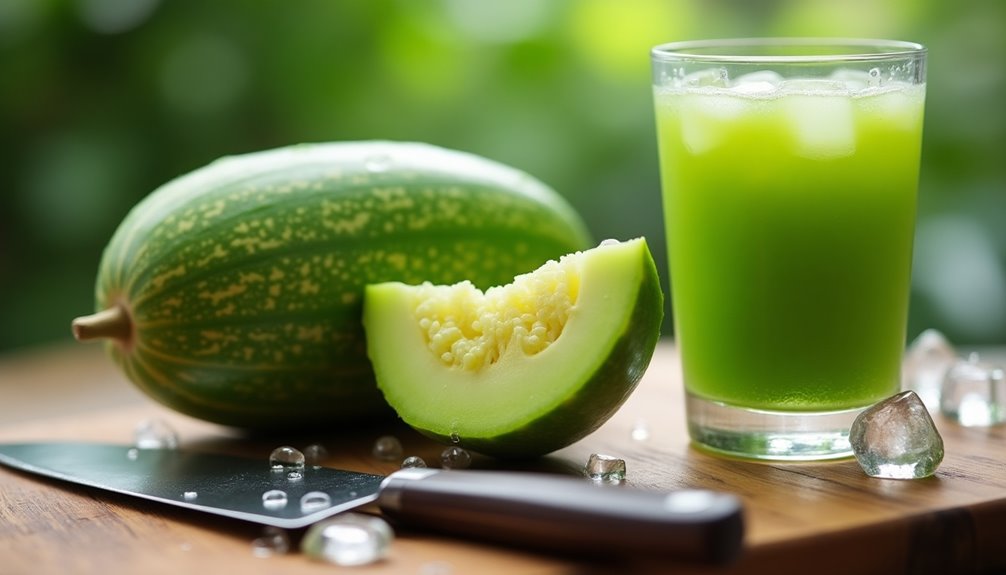
Bitter melon juice mightn't be the first drink that comes to mind, but it packs a powerful punch of health benefits. If you're looking to enhance your diet with something nutritious, this juice is a great choice.
To start, you'll need to gather your ingredients. First, get your hands on two bitter melons. Make sure to wash them thoroughly to remove any dirt. Cut off both ends, then halve them to remove the seeds. It's crucial to remove the seeds, as they can be poisonous if ingested.
Once you've taken care of that, chop the bitter melon into smaller pieces that'll fit into your juicer or blender. The bitterness of these melons can be quite strong, so consider adding a ripe pineapple to balance things out. The sweetness of the pineapple will complement the bitterness, creating a more palatable drink. You can also toss in a small piece of ginger. Ginger not only adds a zing to your juice but also carries its own health benefits, including anti-inflammatory properties.
Next, you'll want to add the juice from one lime. The lime will provide an extra burst of flavor while adding even more health benefits. Additionally, throw in two cucumbers for extra hydration and nutrients. Cucumbers are great for keeping your body hydrated and can help dilute the bitterness of the melons.
Now that you have all your ingredients prepped, it's time to combine them. Put everything into a juicer or blender and mix it up really well. If you're using a blender, you might need to strain the mixture afterward to extract the juice. This will give you a smoother texture while retaining the slight bitterness from the bitter melon and the sweetness from the pineapple.
After straining, you should have a refreshing green juice that's not only tasty but also incredibly good for you. Serve the juice immediately for optimal freshness. Bitter melon juice is best enjoyed right after making it, as the nutrients and flavors are at their peak.
You'll be amazed at how this drink can be both delicious and beneficial for your health. Regular consumption may help regulate blood sugar levels, making it particularly beneficial for those managing diabetes. Plus, it can give your immune system a much-needed boost.
Frequently Asked Questions
How to Make Juice Out of Bitter Melon?
To make juice out of bitter melon, start by washing the melons thoroughly.
Cut off both ends, halve them, and scoop out the seeds. Chop the melon into smaller pieces to aid juicing.
Blend these pieces with a ripe pineapple, a small piece of ginger, and two cucumbers for balance.
Once blended, strain the mixture to get a smooth juice.
Serve it immediately for the freshest taste and maximum health benefits!
Can You Drink Bitter Melon Juice Everyday?
Yes, you can drink bitter melon juice every day, but moderation's crucial.
Limiting yourself to no more than two bitter melons daily helps avoid potential side effects like mild abdominal pain or diarrhea.
If you have specific health conditions, especially if you're pregnant, it's best to consult a healthcare professional first.
Always listen to your body and adjust your intake if you experience any discomfort while incorporating it into your balanced diet.
How to Prepare Bitter Gourd Juice for Drinking?
Did you know that bitter gourd is packed with nutrients, containing up to 95% water?
To prepare bitter gourd juice, wash and chop one large bitter gourd, removing the seeds. Mix it with a teaspoon of salt and let it sit for about 15 minutes.
Squeeze out the juice, blend it with an apple, ginger, and a green chili, then strain. Add lemon juice and salt to taste, and enjoy! For an extra kick, consider adding a handful of fresh mint leaves before blending to enhance the flavor profile. This refreshing drink not only tantalizes your taste buds but also provides a boost of nutrients. If you’re measuring out your ingredients and wondering how many milliliters in 4 ounces, there are approximately 118. 3 milliliters in 4 ounces, ensuring that your proportions are just right for the perfect balance of taste. Enjoy your vibrant beverage as a revitalizing start to your day!
How Much Bitter Melon Tea to Drink Daily for Diabetes?
If you're managing diabetes, it's generally recommended you drink 1 to 2 cups of bitter melon tea daily to help regulate your blood sugar levels.
Start with half a cup to see how your body reacts, then gradually increase your intake. Just be cautious—too much can cause gastrointestinal discomfort.
If you're pregnant or on diabetes medications, consult your healthcare provider first to ensure it's safe for you.
Conclusion
In conclusion, making bitter melon juice is a simple yet rewarding process. Just remember that this unique drink is packed with nutrients; in fact, bitter melon contains more vitamin C than oranges! So, by incorporating it into your routine, you're not just trying something new but also boosting your health. Give it a go, and you might just find a refreshing favorite that supports your wellness journey! Enjoy the benefits and the bold flavors that come with it!
Cindy thoroughly researches juicing trends, techniques, and recipes to provide readers with practical advice and inspiration. Her writing style is accessible, engaging, and designed to make complex concepts easy to understand. Cindy’s dedication to promoting the advantages of juicing shines through her work, empowering readers to make positive changes in their lives through the simple act of juicing.

